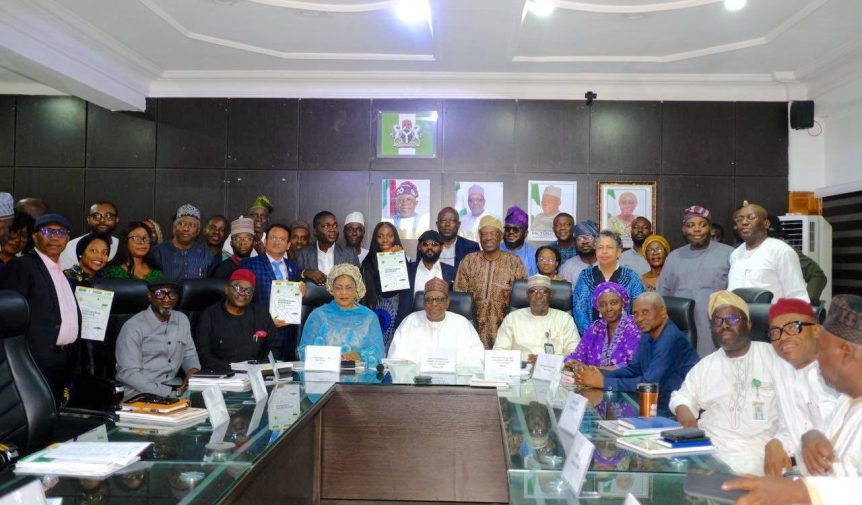“AMR is not just a threat in Nigeria, it goes beyond numbers and has many faces. From the babies with Colistin-resistant bacteria to the communities in Nigeria with water sources containing antibiotic-resistant genes to the poultry meat harboring potentially resistant salmonella, AMR is here with us and it is real.” - Niniola Williams, Managing Director, DRASA Health Trust.

After 27 months of numerous meetings and working closely with 201 One Health stakeholders, we successfully facilitated the development and launch of Nigeria’s One Health AMR National Action Plan (NAP) 2.0. Launched on the 18th of October 2024, by the Federal Ministry of Health and Social Welfare, Federal Ministry of Agriculture and Food Security, and Federal Ministry of Environment in Abuja, the NAP 2.0 is a 5-year strategy to guide multi-sector collaboration across the human, animal, and environmental sectors to protect citizens from the risk that AMR poses to our health.
As the country’s first AMR NAP expired in 2022, there was an urgent need to develop a new national AMR strategy building on the successes and failures of the first one and incorporating the current landscape of AMR across the country.
Our road to the development of this NAP 2.0 was one that used a participatory, consultative approach to develop well-defined strategic objectives for Nigeria’s coordinated response to AMR and aimed to address challenges and outline priority AMR interventions for the human health, animal health, environmental, and the agricultural sectors.
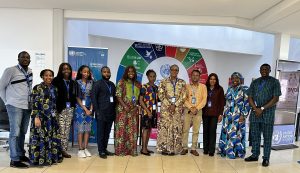
The launch ceremony marked the end of a journey that began with a review of the first NAP which assessed its successes and shortcomings and provided insights that informed the development of the new strategy. That was followed by an in-depth situational analysis of AMR across the country and across sectors which provided insight and data to inform the development of the NAP 2.0, ensuring that all proposed intervention areas and activities in the strategy are evidence-based. Data for the situational analysis was collected using an inclusive, people-centered method that included desk reviews, systematic reviews, and over 40 key informant interviews with stakeholders from the three sectors. The results of this situational analysis provided valuable global and local insights into antimicrobial usage in Nigeria.
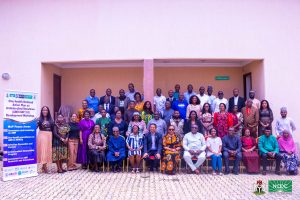
Driven by numerous national stakeholders working alongside the United Nations (UN) quadripartite: the Food and Agriculture Organization of the UN (FAO), the UN Environment Programme (UNEP), the World Health Organization (WHO), and the World Organization for Animal Health (WOAH); the multi-stakeholder support in the development of the new strategy ensured the NAP 2.0 took a participatory and truly One Health approach.
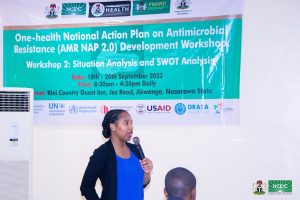
In August 2023, after thorough planning, research, and preparation, we initiated a series of development workshops for the NAP 2.0, which began with an intensive stakeholder mapping exercise to collect insights from a range of domestic and international stakeholders. Our goal was to identify and analyze the key stakeholders for the NAP 2.0 development and implementation using a mapping tool, define roles and responsibilities, and define specific activities, timelines, and responsible parties for engaging stakeholders at various stages. We also created a smaller technical working group that was essential in driving the strategy development process. At the end of this exercise, we identified 146 stakeholders to foster a collaborative and coordinated approach to the AMR NAP 2.0 development and implementation.
Shortly thereafter, at the second development workshop, we gathered experts to review the One Health AMR Situational Analysis to validate its findings and conclusions and conducted a SWOT analysis to identify key areas for immediate attention and action to strengthen AMR prevention and control through collaborative and cross-sectoral efforts. This analysis was instrumental in laying the groundwork for the strategic and operational plan of the NAP, ensuring that the recommendations from the NAP 1.0 review, Situational Analysis, and current AMR data were effectively integrated.
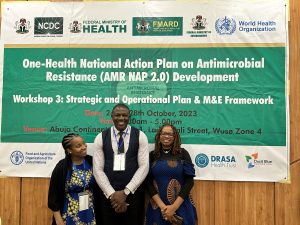
Developing a national strategy requires more than just reviewing data, identifying strengths and weaknesses, and harmonizing recommendations. Therefore, in October 2023, an additional workshop was carried out to refine the initial draft of the 5 year strategic and operational plans. The goal was to identify priority interventions, establish actionable plans, and determine measurable indicators that align with both regional and global strategies on AMR. Additionally, a monitoring and evaluation framework was created to define how success will be measured as the activities are implemented over the five-year time period.
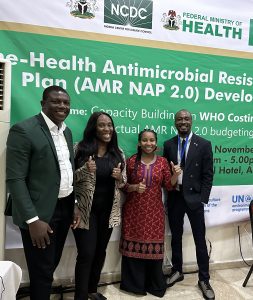
The final workshop took place in November 2023 to outline the budget and costs associated with implementing the AMR NAP 2.0 as without clarity on the cost implications and resources required to achieve the NAP 2.0 goals, its implementation would suffer. During this session, we assessed resource requirements, developed a comprehensive budget, explored innovative funding and resource mobilization mechanisms, and evaluated resource distribution across sectors with various stakeholders from the One Health sectors, along with representatives from the Federal Ministry of Finance and the Federal Ministry of Water Resources.

The NAP 2.0 is a testament to the collaborative effort of both local and international One Health stakeholders who have employed necessary strategies to provide evidence-based, and context-specific actions that Nigeria must take in the next five years to combat antimicrobial misuse. The message of the NAP 2.0 5-year strategic plan is simple: To improve education and awareness, improve AMR stewardship and leadership, improve access to quality antimicrobials and vaccines, and foster behavior change among citizens to ensure a lasting impact.
AMR is a growing pandemic that puts everyone at risk of not being able to treat infections after taking medications. We are proud to have played a key role in supporting Nigeria’s efforts to combat AMR by contributing to the development and implementation of the NAP 2.0. Our involvement included coordinating partnerships, reviewing the NAP 1.0, conducting a comprehensive situational analysis, and providing both technical and financial support from inception to completion. We also supported the printing and launch of the NAP 2.0 document.
Building on this foundation, we are now actively supporting the implementation of NAP 2.0 across the One Health sectors to ensure its interventions are effectively rolled out and impactful. Our continued commitment is to prevent drug-resistant infections and create a healthier, safer future for all.
Read more about antimicrobial resistance here.
Watch the live recording here:




